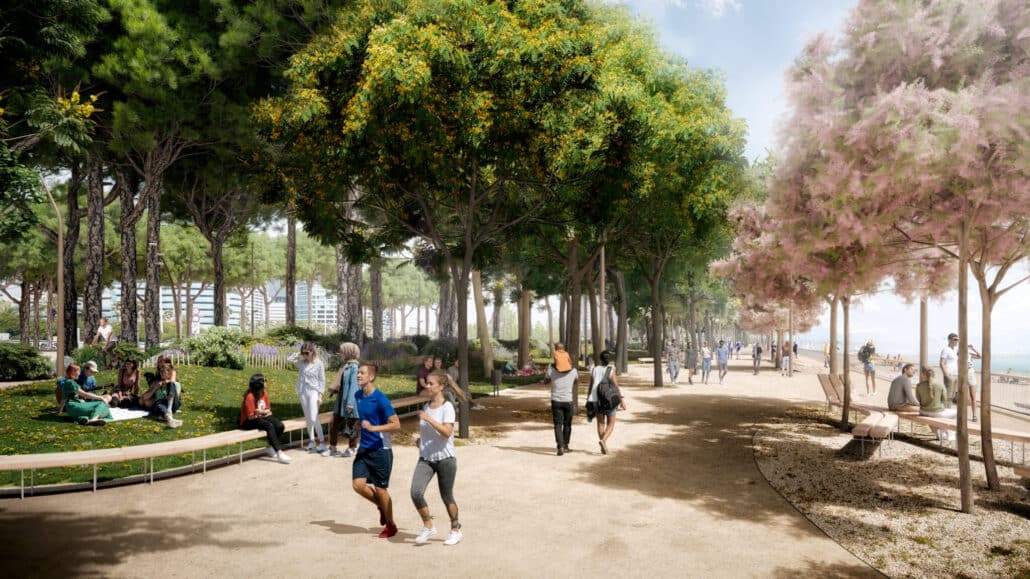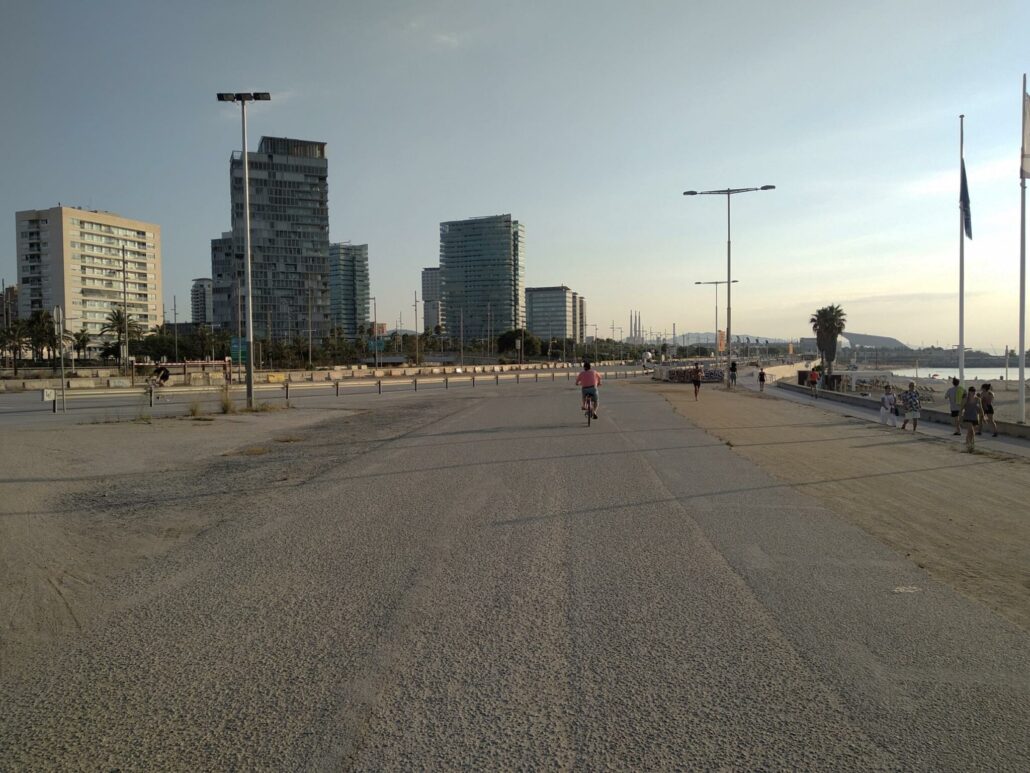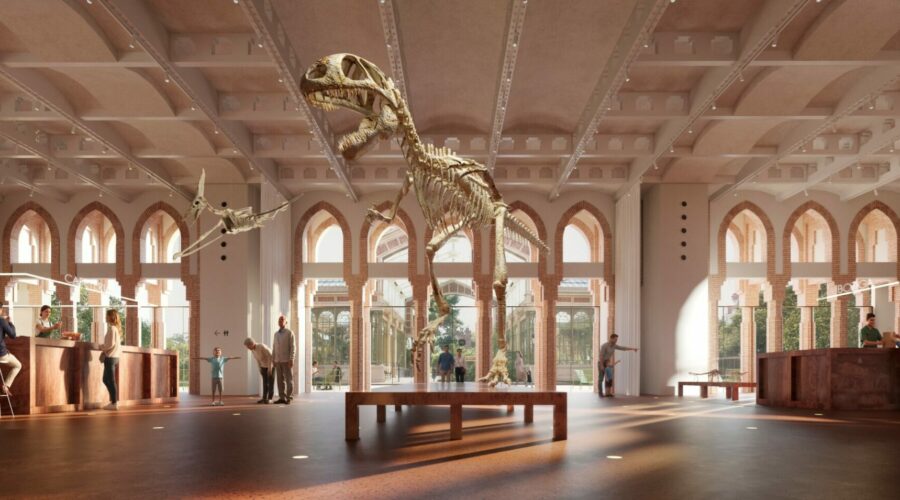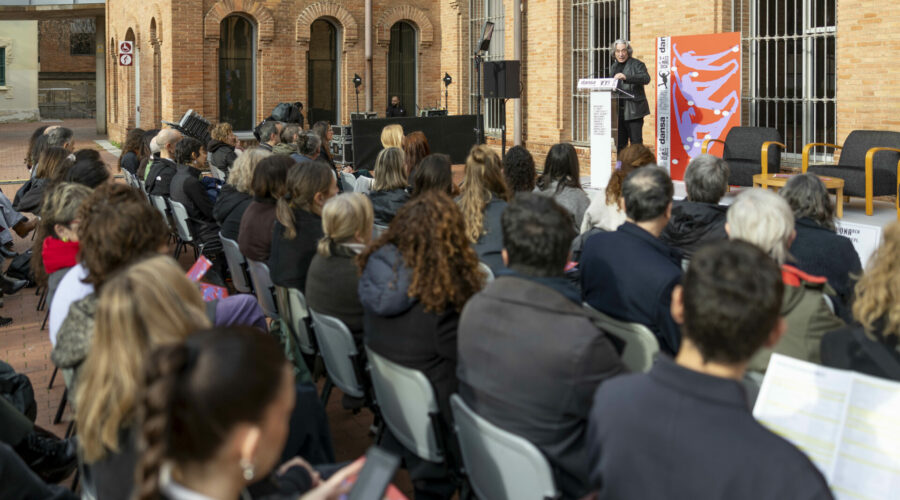Barcelona continues to advance in its urban transformation with the renovation of the Mar Bella Promenade, a project that has been adapted to the effects of climate change. The city seeks to ensure the preservation of its beaches and prepare its coastline for the challenges posed by global warming. This ambitious plan includes storm protection measures, the creation of new green spaces and a focus on sports. The work, which will begin in the spring of 2025, will mark an important step towards a more naturalized and resilient coastline.
 Climatic urbanism: a storm-resistant promenade
Climatic urbanism: a storm-resistant promenade
The recent storms Ciarán and Domingos, which severely affected Barcelona’s coastline, have made it clear that climate-adapted urban planning is necessary. These extreme events damaged the promenade wall and eroded the Nova Mar Bella beach, forcing the City Council to rethink the project initially approved in 2023. After an updated study of maritime dynamics with a view to 2050 and 2080, it was decided to remove part of the wall and reinforce the Llevant and Nova Mar Bella beaches, ensuring their long-term preservation.
Palau Martorell hosts the Sorolla exhibition
This project is part of Barcelona’s Pla Clima, a comprehensive strategy to adapt the city to new climatic realities. The redevelopment of the coastline not only seeks to improve infrastructure, but also to ensure that these spaces are more resilient and sustainable in the face of increased extreme weather events.
A new promenade for sports and leisure activities
The transformation of the Paseo Marítimo de la Mar Bella not only involves structural improvements, but also the creation of a space designed for the practice of sports and the enjoyment of citizens. The new promenade will be surrounded by vegetation and will have a 4-meter wide bike lane, thus promoting active mobility. In addition, spaces will be created for beach volleyball, children’s play areas and rest areas overlooking the sea.
The width of the promenade, which will reach 12 meters in some areas, guarantees a comfortable and safe space for pedestrians and cyclists. The Bac de Roda, Selva de Mar and Josep Pla bridges will be the main connections between the city and the coastline, and squares will be built around them to house information points, picnic areas, picnic areas and bicycle parking. The project also includes the planting of 1,000 new trees of 17 different species, creating a green and fresh environment that will offer shade and comfort to visitors. Thirty-two percent of the promenade will be green, with meadows and shrub species that will contribute to the naturalization of the coastline.
A focus on sustainability and renewable energy
In addition to being a space designed for leisure and sports, the new Mar Bella Promenade will be aligned with Barcelona’s sustainability objectives. Photovoltaic pergolas will be installed at the Selva de Mar and Josep Pla entrances, with a total energy collection capacity of 38.5 kWp, which will generate electricity in a clean and efficient way.
El Buki Marco Antonio Solís touring Barcelona
The project also contemplates the modernization of the subway infrastructure, with the renovation of the key-gueram, the lighting system and the telecommunications network, which will guarantee a modern and well-equipped promenade for the future.
Relocation of the municipal soccer field
One of the challenges posed by this renovation is the need to move the Can Aranyó-Agapito Fernández soccer field, provisionally located in the area. To adapt to the new configuration of the promenade, the field will be definitively moved to one end of the Plataforma Marina del Fòrum, where a new facility will be built with bleachers and improved services. This process will be carried out in several phases so that the field will remain in operation during the works, ensuring that the clubs that use it can continue to train and compete without interruption. Work on the new field will begin in the spring of 2027 and is expected to be completed in January 2028.
Pavelló Blau: a great space for sports on the coastline
The redevelopment of the Mar Bella Promenade is part of a larger project known as Pavelló Blau, which seeks to create a large public space dedicated to sports along Barcelona’s seafront. This project covers a total of 5 kilometers, from Port Vell to Port Fòrum, and will include facilities for the practice of 40 different sports, all related to the sea and the beach.
Barcelona inaugurates its first maritime bus
Pavelló Blau is emerging as a benchmark for outdoor sports in Barcelona, with areas for water activities, sand sports and recreational spaces on the second line of the sea. The renovation of the Mar Bella Promenade will be a key part of achieving this goal, offering new opportunities for sport and leisure on the coast.
A sustainable future adapted to climate change
With this transformation, Barcelona’s coastline will gain a modern, resilient and naturalized promenade, adapted to the new climatic conditions. The project not only guarantees the preservation of the beaches, but also creates an accessible and safe space for everyone, where sport and nature go hand in hand. Barcelona City Council has earmarked a total of 17.8 million euros for this project, which will be developed in several phases until its completion in 2029. With this investment, the city is making progress in its commitment to sustainability and climate resilience, laying the foundations for a coastline that can meet the challenges of the future.


 Climatic urbanism: a storm-resistant promenade
Climatic urbanism: a storm-resistant promenade

